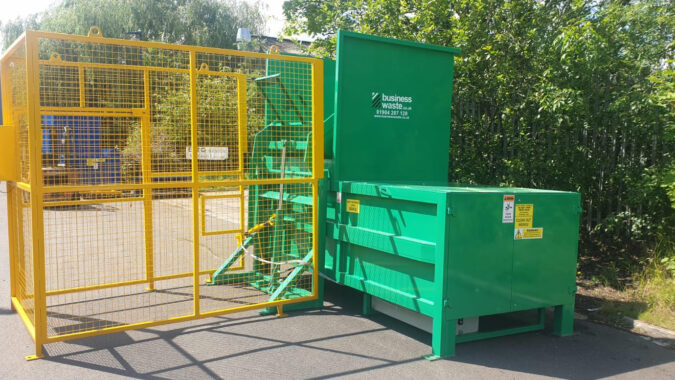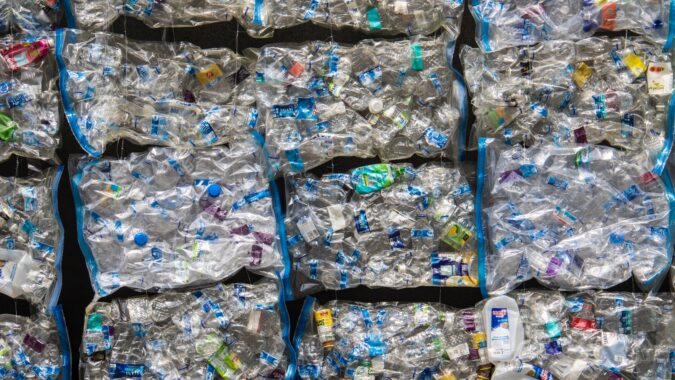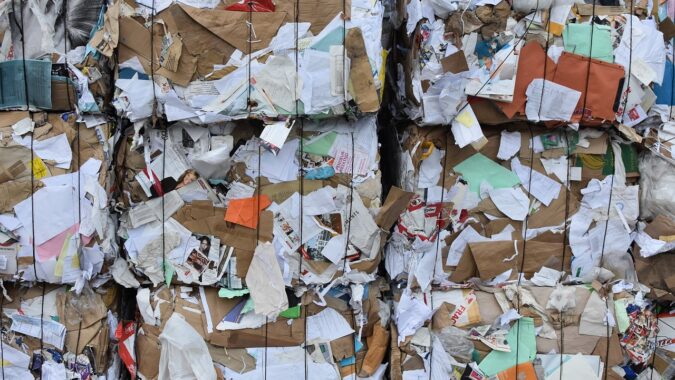What is a Baler?
A baler is a machine used in waste management to compact and compress materials into dense bales. These are then strapped together and transported for recycling. Balers reduce bulky, dry, and loose types of trash such as cardboard, paper, plastic, aluminum cans, textiles, and other waste types in their individual streams.
Using a waste baler can reduce the volume of trash by up to five or ten times the amount, depending on the material and size of the baler. It produces a uniform bale size that saves space for storage, lowers transport costs and emissions, and improves recycling.
Many businesses and industries that produce high volumes of recyclable trash streams use balers to save money, effort, and space. They’re popular in retail, manufacturing, and hospitality, but other sectors also benefit from them. Discover all you need to know about waste balers, how they work, and why your business should consider one.

How does a baler work?
Balers compact waste materials into a uniform cube or cuboid, with the dimensions depending on the size and type of baler. How a baler works is relatively straightforward. Materials are fed into the compaction chamber, and a hydraulic cylinder pushes the ram to apply consistent pressure against the waste.
This force compresses everything together and significantly reduces its volume within the baling or compaction chamber. It forms a uniform and dense bale. Depending on the type of machine, the bale is then either automatically tied with baling wire or it’s ejected as a bale that requires strapping manually.
These are the general steps to use a baler:
- Load the waste – separate trash into individual waste streams and feed the materials into the compaction chamber. Some horizontal balers use a conveyor belt while others require manual loading.
- Compress the load – the hydraulic ram applies pressure to compact the materials into a dense bale, reducing gaps of air.
- Tie the bale – depending on the type of baler, the bale might be automatically tied with baling wire, twine, or other strapping to maintain its shape.
- Remove the bale – the bale is ejected from the chamber. If it wasn’t automatically wrapped it will need to be strapped manually before removal.
- Store and recycle – use a forklift to move the bale to an appropriate storage place before it’s removed and transported to a recycling center.
Why should your business use a baler?
If your business regularly produces large amounts of recyclable waste materials such as cardboard, paper, plastic, metal, and textiles, then using a baler could save you money, time, and effort. Balers can reduce the volume of waste by five to ten times the original size, which saves floor space.
Even though the baler requires some floor space, it can make storage more efficient as you won’t need as many dumpsters or containers. Bales are easy to move and stack. Transportation is more efficient too, as fewer collections are required, which reduces emissions and costs while being easier to load and unload onto trucks.
Baling waste can save your organization money. Reducing the volume of trash by five to ten times means you’ll pay for fewer dumpsters and collections. You might also qualify for a rebate depending on the amount and type of waste that’s baled.
Balers aren’t suitable for all businesses though. If you don’t create lots of recyclable trash or have limited space and accessibility, then using a baler might not be efficient or cost-effective. Consider dumpster rental as a suitable alternative.

What is a baler used for?
Balers are used to compact clean, dry, and loose recyclable materials. Any trash put in a baler should be separated into individual waste streams to improve recycling. They can be used to produce bales of cardboard, paper, and textiles that reduce the risk of contamination and are easy to transport and recycle.
You can also use them for scrap metal and plastic. These can be separated into specific types, such as using a baler for just aluminum cans or HDPE plastic waste. These are some examples of the types of balers and what you can use them for:
- Cardboard balers – cardboard boxes, sheets, corrugated cardboard, packaging.
- Paper balers – newspapers and magazines, office and printer paper, paper cups.
- Plastic balers – plastic packaging, bottles, bags, wrap, cups, HDPE and PET plastics.
- Metal balers – aluminum cans, scrap metal, offcuts, automotive parts.
- Clothing balers – damaged, used, and excess clothes, bedding, rugs, upholstery.
What is a mill size baler?
A mill size baler works the same as any other waste baler, with the difference being the size of the machine and the bales it produces. As the name suggests, they create a ‘mill size bale’ that is 60″ x 42″ x 30″. These bales normally weigh between 800 and 1,000 pounds, depending on the material.
They produce a standard mill size bale that can be sent directly to the waste management center for recycling with no extra work required. Mill size balers can be vertical or horizontal balers. They’re large machines suitable for businesses with high volumes of cardboard, plastic, steel, paper, and other waste.
Baler vs compactor
There are many similarities between waste balers and compactors. Both compress trash to reduce its volume for easier and more cost-effective storage and management. The difference is in the types of materials they process and their output. Balers create blocks of recyclable trash while compactors usually condense municipal solid waste (MSW) into the container.
Both balers and compactors save space and money by requiring fewer dumpsters and collections, and carbon emissions with less transportation. However, balers produce bales that can be moved, while compactors condense the trash within the container that then needs removing.
These are the key points to compare a baler vs compactor:
- Balers – used to compress recyclable materials into uniform bales that are ejected and easy to stack, transport, and store.
- Compactors – used to compact solid waste and non-recyclable trash into a container. The container is removed once full and transported to a waste management center or landfill.

Types of waste baler machines
Waste baler machines all do the same job of compressing materials, but there are various types available. The shape and size of the baler, the dimensions of the bales they produce, and how much of the process is automated are the key differences between them.
These are some of the main factors to consider when choosing a waste baler:
- Automatic balers – these are normally horizontal balers where the materials are loaded onto a conveyor and the baler takes care of the rest. It moves the load along, compresses and wires the bale, before ejecting it.
- Semi-automatic balers – the materials are loaded in and baled but an operator must prepare it with baling wire before ejection or strap it together after it has been compacted.
- Vertical balers – smaller, tall, and compact vertical balers crush waste together vertically. They’re best for businesses with limited floor space or that produce lower volumes of recycling. Stores, warehouses, and supermarkets often use vertical balers.
- Horizontal balers – these are larger balers that require more floor space but can process higher volumes of waste and produce bigger bales. They often have more powerful compression that can handle harder materials like scrap metal. Horizontal balers are popular with manufacturers, distribution centers, and scrap yards.
- Two-ram balers – some of the most powerful baler machines are two-ram balers. They’re a type of horizontal baler that, as the name suggests, has two hydraulic cylinders. This provides more pressure to compact greater amounts of recycling.
Rent a baler with Business Waste
Think a baler could benefit your business? We can supply a wide range of types and sizes of waste balers for companies of any size and industry. Tell us about the waste materials you produce, the estimated volume, and a few more details for a bespoke no-obligation quote.
All waste is kept away from landfill, with regular collections of your baled waste possible. Speak to one of our friendly team to find out more about baler rental and get a free no-obligation quote today – call 888 584 2118 or contact us online.
Have your waste collected
Get a fast FREE quote for your waste collection 0800 211 83 90
- Free quote within 1 hr
- Any type of waste
- FREE bins and delivery
- We cover all of the UK